Advice
You can find answers to frequently asked questions about some of our treatments here, as well as lifestyle advice for maintaining healthy teeth. If you have any questions that aren’t answered here, please contact us.
Tooth brushing
Daily brushing and cleaning between your teeth is important because it removes plaque. If the plaque isn’t removed, it continues to build up, feeding on the food debris left behind and causing tooth decay and gum disease.
How can plaque cause decay?
When you eat food containing sugars and starches, the bacteria in plaque produce acids, which attack tooth enamel. The stickiness of the plaque keeps these acids in contact with teeth. After this happens many times, the tooth enamel can break down forming a hole or cavity.
How can plaque cause gum disease?
Plaque can harden into something called calculus another name for it is ‘tartar’. As calculus forms near the gum line, the plaque underneath releases poisons causing the gums to become irritated and inflamed. The gums begin to pull away from the teeth and the gaps become infected. If gum disease is not treated promptly, the bone supporting the teeth is destroyed and healthy teeth may be lost. Gum disease is the biggest cause of tooth loss in adults, which requires treatments such as dentures, bridges or implants.
How can I prevent gum disease?
How do I know if I have gum disease?
Gum disease (gingivitis) will show itself as red, swollen gums that bleed when brushed or flossed. Many people are alarmed when they notice this bleeding and will then brush more gently, if at all. It is important that you continue to clean regularly and firmly in order to fight the condition.
Which type of toothbrush should I use?
Your dentist or dental hygienist will be able to recommend a toothbrush to you. Adults should choose a small to medium size brush with soft to medium multi-tufted, round-ended nylon bristles or ‘filaments’. The head should be small enough to get into all parts of the mouth – especially the back of the mouth where cleaning can be difficult. Children need to use smaller brushes but with the same type of filaments.
You can now get more specialised toothbrushes. For instance, people with sensitive teeth can now use softer bristled brushes. There are also smaller headed toothbrushes for those people with crooked or irregular teeth. Some people find it difficult to hold a toothbrush because, for example, they have Parkinson’s disease or a physical disability. There are now toothbrushes, which have large handles and angled heads to make them easier to hold.
How often should I change my toothbrush?
Worn out toothbrushes cannot clean your teeth properly and may damage your gums. It is important to change your toothbrush every two to three months or sooner if the filaments become worn. When filaments become splayed, they do not clean properly.
How should I brush?
Brushing should remove plaque and food particles from the inner, outer and biting surfaces of your teeth. Here is one method of brushing that should remove plaque:
- Place the head of your toothbrush against your teeth and angled against the gum line. Move the brush in small circular movements, several times, on all the surfaces of each individual tooth.
- Brush the outer surfaces of each tooth, upper and lower, keeping the bristles angled against the gum line.
- Use the same method on the inside surfaces of all your teeth.
- Brush the chewing surfaces of the teeth.
- To clean the inside surfaces of the front teeth, tilt the brush vertically and make several small circular strokes with the front part of the brush.
- Brushing your tongue will help freshen your breath and will clean your mouth by removing bacteria.
How often should I brush my teeth?
Mothers, pregnancy, babies and toddlers
Pregnancy
Your baby's mouth
Teething and chewing
Use bottles with care
Looking after toddler’s teeth
Strong teeth
Brushing up
Getting the balance
Drink up!
The dentist’s chair
In summary
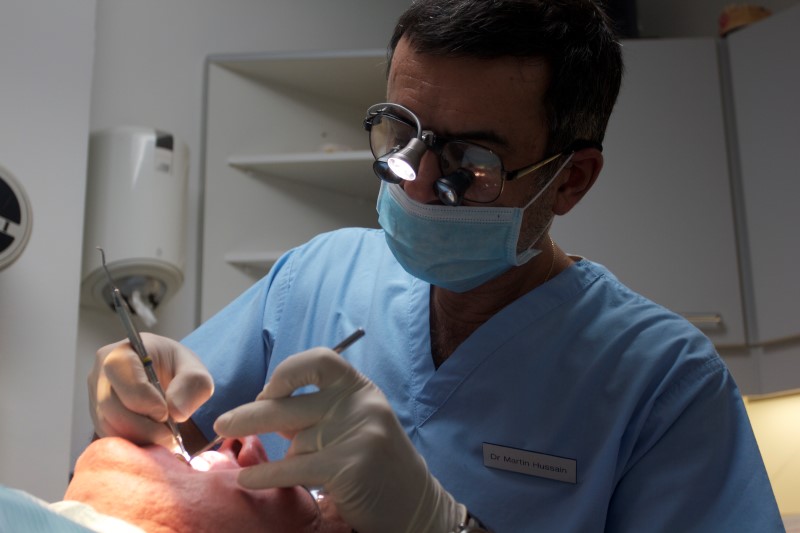
Growing up with healthy teeth
A lovely smile with sparkling teeth looks great and will give a child confidence. Fortunately you can keep them in tip-top condition, so get your children into the good habits outlined below and they will have healthy teeth for life.
This information is designed for parents and carers of children between 2 and 18 years old.
The root of the problem
Brush twice a day under adult supervision
Toothpaste matters
Which toothbrush?
What children eat
When children eat
Bedtime
Bad breath in children
Top tips for great teeth
Safe snacks and drinks for teeth
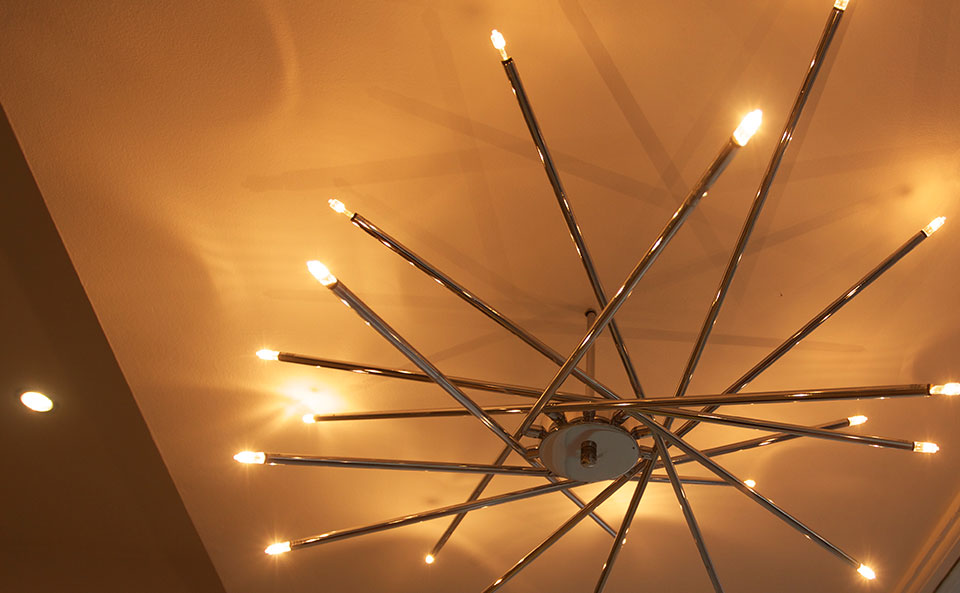
Bad breath (halitosis)
Bad breath is a common problem which often results from the activity of bacteria in the mouth. Although there is no way of knowing for sure, most adults probably suffer from bad breath occasionally, with perhaps a quarter suffering on a regular basis. Bad breath originates in the mouth about 85-90% of the time and more rarely from the gastrointestinal tract. The dentist should be the first person that a patient worried about bad breath should consult.
Causes of bad breath
Treatment
-
In most cases bad breath can be treated by proper dental care, deep tongue cleaning and, if necessary, rinsing with an effective mouthwash. Dentures can be cleaned and patients are instructed to leave them overnight in an antiseptic solution.
Patients should use dental tape for removing plaque between teeth as well as the correct toothbrush and correct brushing technique. These can be discussed with your dentist.
Gentle but effective deep tongue cleaning should be an important daily routine. A variety of tongue scrapers have been produced in recent years. Alternatively, cleaning the tongue can also be performed by brushing with a toothbrush, without using toothpaste.
In order to prevent tongue odour the tongue should be brushed in a gentle but thorough manner, keeping in mind that the back area is the least accessible, yet smells the worst.
Since bad breath is worse when the mouth dries out (e.g. at night or while fasting), maintain a good water balance. Chewing gum may also be helpful in reducing bad breath for a while during the daytime, although this should be restricted to only a few minutes at a time.
Many people continue to have bad breath even after trying their best to clean their mouth. In such cases rinsing and gargling with a strong mouthwash may be thought necessary (such as Corsodyl mouthwashes). However, many mouthwashes contain components which may have a non-beneficial affect on oral tissues. It is very important that you discuss this with your dentist.
The best time to use a mouthwash is probably before bedtime since
- The residue in the mouth rinse may remain in the mouth for a long period of time
- Bacterial activity increases at night when saliva flow is negligible
How to combat bad breath
- Visit your dentist regularly.
- Have your teeth de-scaled and polished periodically by your dentist.
- Floss between your teeth, as recommended by your dentist.
- Brush your teeth and gums properly.
- Ask your dentist to recommend a toothbrush or scraper for your tongue and clean your tongue all the way to the back gently but thoroughly.
- Drink plenty of fluids.
- Chew sugar-free gum for a minute or two at a time, especially if your mouth feels dry.
- Chewing parsley, mint, cloves or fennel seeds may also help.
- Clean your mouth after eating or drinking milk products, fish and meat.
- Unless your dentist advises otherwise, soak dentures overnight in an antiseptic solution.
- Ask close friends or family members to advise you if you have bad breath.
- Ask your dentist to recommend a mouthwash which has been shown to be clinically effective in fighting bad breath and use it most effectively, i.e. before sleeping.
Do nots
- Don’t let concern about having bad breath ruin your life. Don’t be passive.
- Don’t be depressed, get help.
- Don’t drink too much coffee, it may make the situation worse.
- Don’t forget to clean behind the back teeth in each row.
- Don’t brush your tongue with regular toothpaste. It is better to dip your toothbrush in mouthwash for tongue cleaning.
- Don’t run to your gastroenterologist (someone who specialises in treating digestive disorders) with concerns about bad breath. It usually comes from the mouth and almost never from the stomach.
- Don’t give mouthwash to very young children as they can swallow it.
- Don’t clean your tongue so hard that it hurts.
- Don’t rely on mouthwash alone. Practice complete oral hygiene, i.e. brushing, flossing and tongue cleaning.
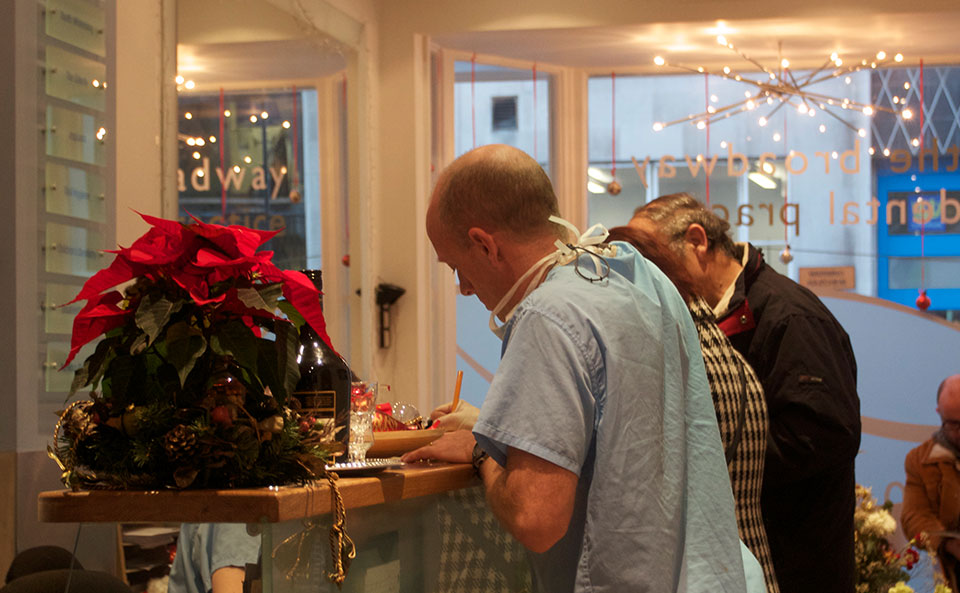
Periodontal disease
Periodontal disease affects four out of every five people and, in adults, is the major cause of lost teeth. Periodontal disease (gum disease) is an inflammation or infection which attacks the gums and bones which hold your teeth in place.
The signs of periodontal disease
Causes of gum disease
Diagnosis of gum disease
Gum disease in summary
Treatment
Maintenance visits
How to brush your teeth
Interdental cleaning
Interdental brushes
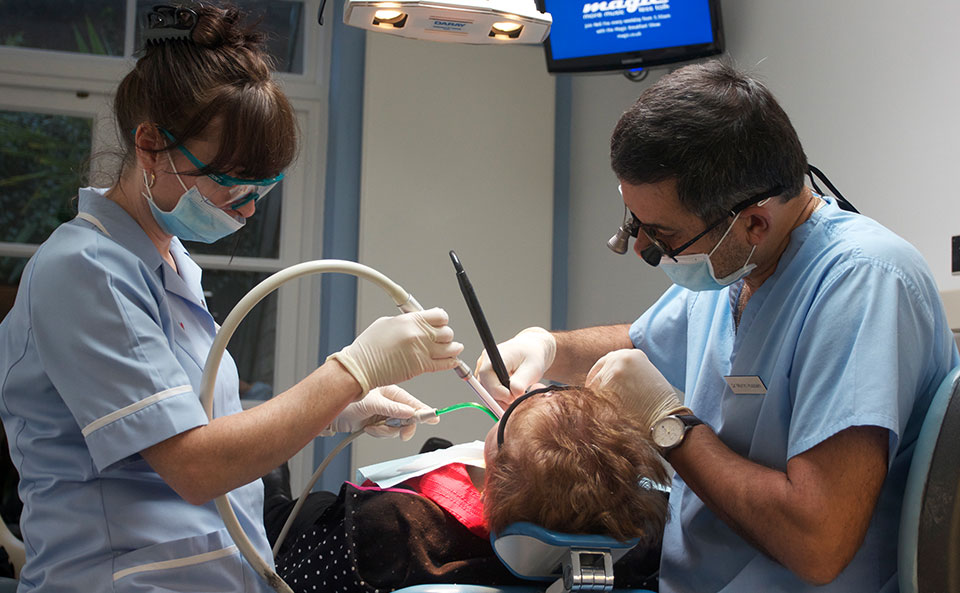
Wisdom tooth removal
Your wisdom teeth are the last teeth to emerge from your gums. This usually happens during the late teens, or ‘the age of wisdom’, which gives them their name. Often there is not enough room for them in the jaw; they may become trapped (or impacted) in the jaw bone and gums, and remain fully or partially buried. In this case, they may need to be removed.
Why do we have wisdom teeth?
Why do we remove impacted wisdom teeth?
What should you expect after a removal of an impacted wisdom tooth?
Are there any risks?

Implants
A dental implant is a titanium metal rod which is placed into the jawbone. It is used to support one or more false teeth. In practice, both the false teeth and their supporting rod are known as ‘implants’.
If you are considering dental implants, more advice is available from the Association of Dental Implantology UK. The Broadway Dental Practice is a member of the ADI and we adhere to its charter. We use Bicon implants.
Are implants safe? How long will they last?
I have some of my own teeth. Can I still have implants?
Can implants always be used to replace missing teeth?
Do implants hurt?
Can I have the new teeth straight away?
How long does treatment take?
Are the teeth difficult to clean?
If I had gum disease when I had my own teeth, will I get it with the teeth attached to the implants?
Can I take the teeth out if they are fixed to implants?
Do the implants show?
Do I have an implant for each missing tooth?
What happens if the implant does not bond (integrate) with the bone?
Where do I get this treatment?
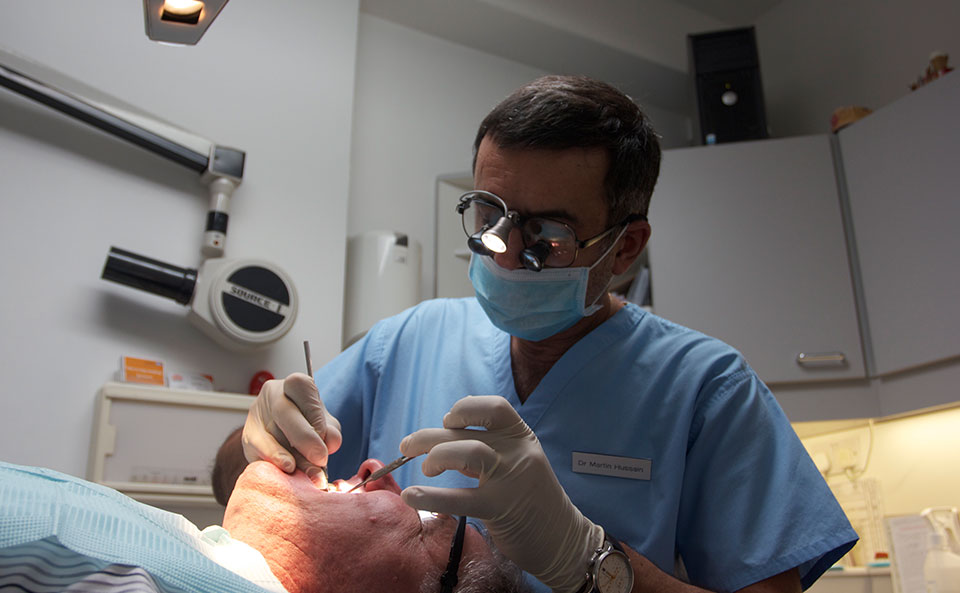
Veneers
A veneer is a thin layer of porcelain made to fit over the front surface of a tooth, like a false fingernail fits over a nail. Sometimes a natural colour composite material is used instead of porcelain.
What are the advantages of veneers?
When would I need a veneer?
How are teeth prepared for a veneer?
How long will it take?
What happens after the veneer is fitted?
What about alternatives?
How long will a veneer last?

Whitening
Tooth whitening can be a highly effective, simple way to lighten the colour of teeth without removing any of the tooth surface.
What does the procedure involve?
How long does the procedure take?
Why would my teeth need to be bleached?
Will I be happy with the results?
What about home kits?
When might whitening not work?
What about whitening toothpaste?
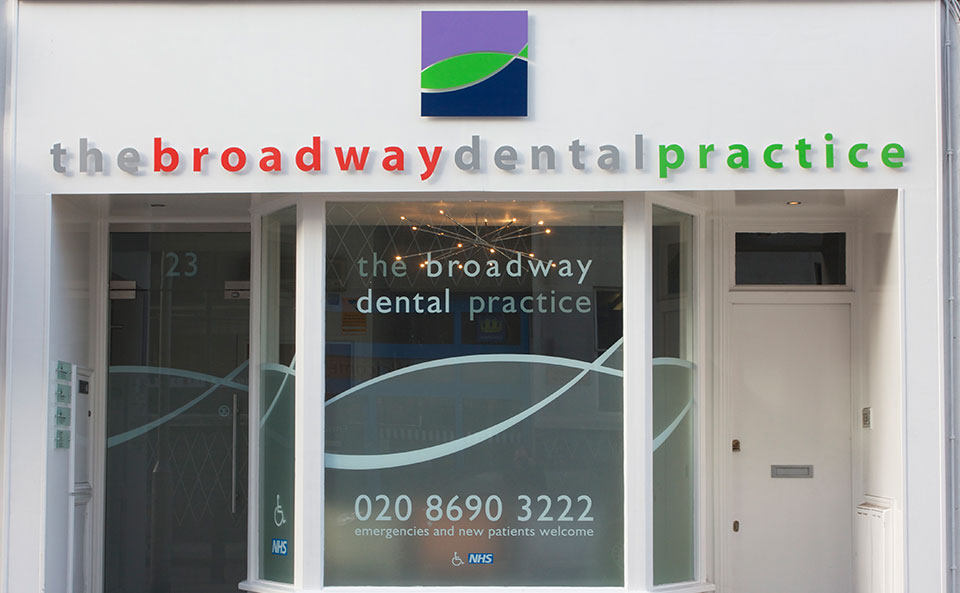
Sedation
Intravenous sedation has been used in dentistry for many decades to help very nervous patients receive dental treatment. This can be safely done in the dental surgery in a relaxing environment, carried out at our practice by trained dentists with trained supporting staff. The practice is registered with the Health Authority to provide this form of care.
How does sedation work?
How safe is sedation?
What do I need to do on the day of my treatment?
What precautions do I need to take after receiving sedation?
- Do rest for a few hours and take it easy for the rest of the day.
- Do eat light and easily digestible food for the rest of the day.
- Do take any medicines, tablets or pills which have been prescribed for you.
- Do not drink any form of alcohol until the following day.
- Do not drive any vehicle, operate machinery or make any business decisions on the same day on which you have had your treatment as your reflexes and judgement may have been impaired.
How can I stay comfortable after my appointment?
- Do clean your teeth as normal, but be gentle.
- Do not rinse your mouth rigorously.
- Avoid very hot fluids or hard foods. If a wound or extraction socket starts to bleed, roll up a cotton handkerchief, place accurately over the bleeding point and bite firmly for 15 minutes. If you continue to bleed profusely, then telephone your dental surgeon for advice.
- Any pain or discomfort can be relieved by taking a pain relieving preparation which does not contain aspirin, e.g. paracetomol.
- If prolonged bleeding or pain occurs do contact your dentist.
After fillings:
- Avoid hard food and try to chew away from the new fillings where possible.
- Chew softer foods and consume cool drinks. Try to avoid very hot and very cold drinks.
What training and experience have your staff had in intravenous sedation?
Dr. Hussain completed the sedation certification course (SAAD) in 1989, followed by regular update courses. He has also spent three to four years with a special consultant oral surgeon, spending one session a week carrying out oral surgery under intravenous sedation on patients. Experience was gained on approximately 1,000 patients during this period.
Dr. Murr completed the sedation certification course (SAAD) in 1998.
Ms. Jacqui Coveney and Ms. Sam Pearce have attended the SAAD course for dental assistants and have received certification. We undergo regular refresher courses in the practice to simulate emergency procedures to maintain basic life support.
All other staff have regular updates in basic life support for emergencies.
If you have any questions please do not hesitate to speak to your dentist or any other member of staff.
